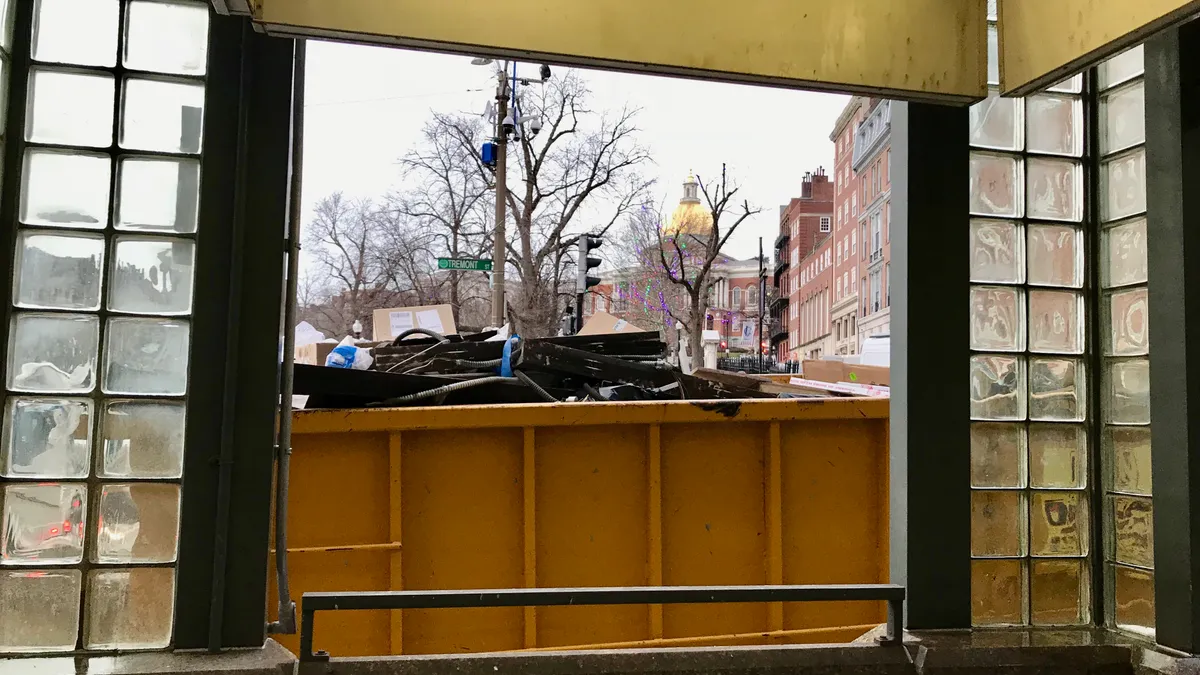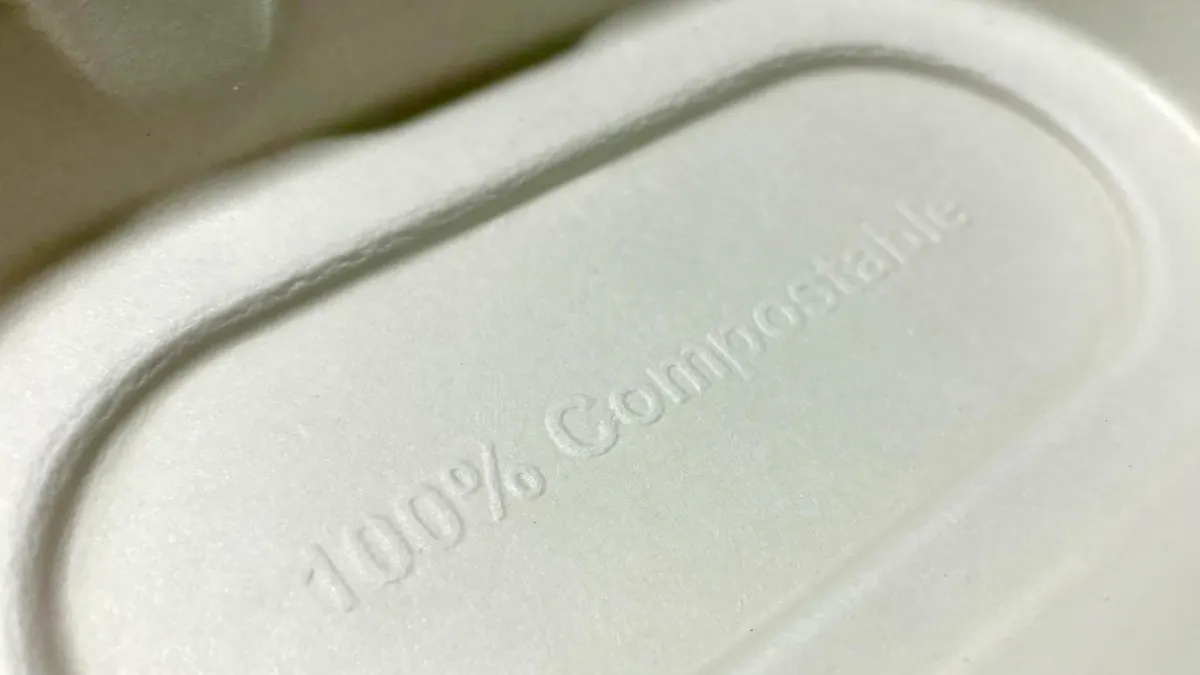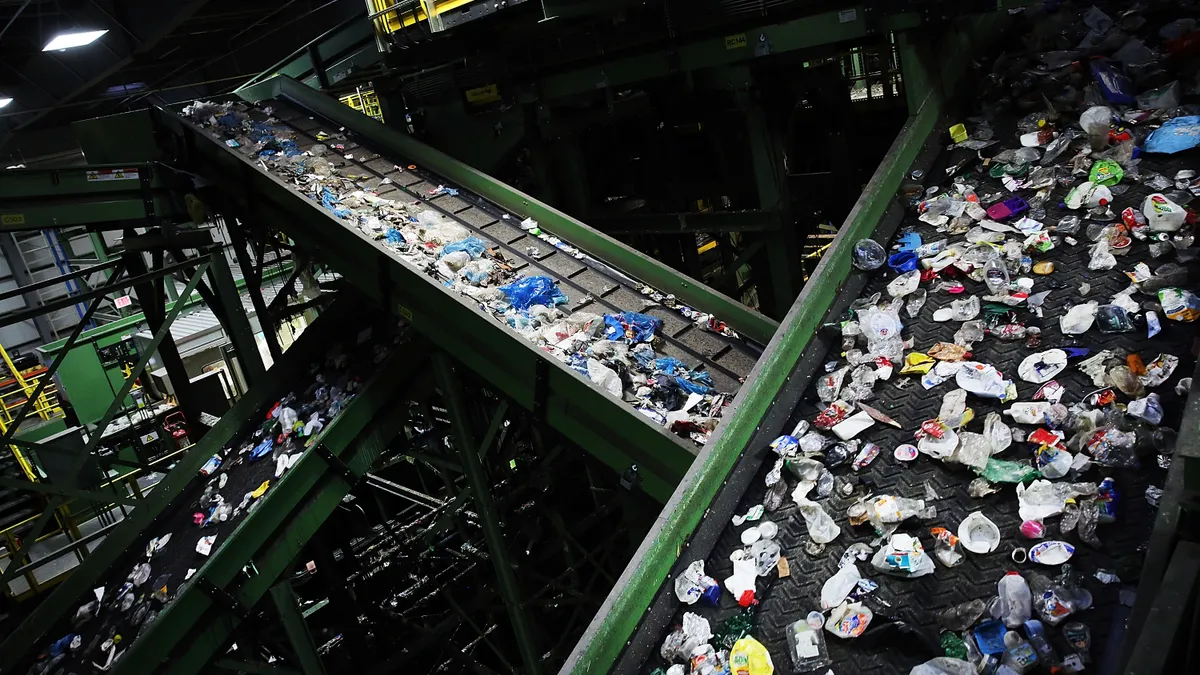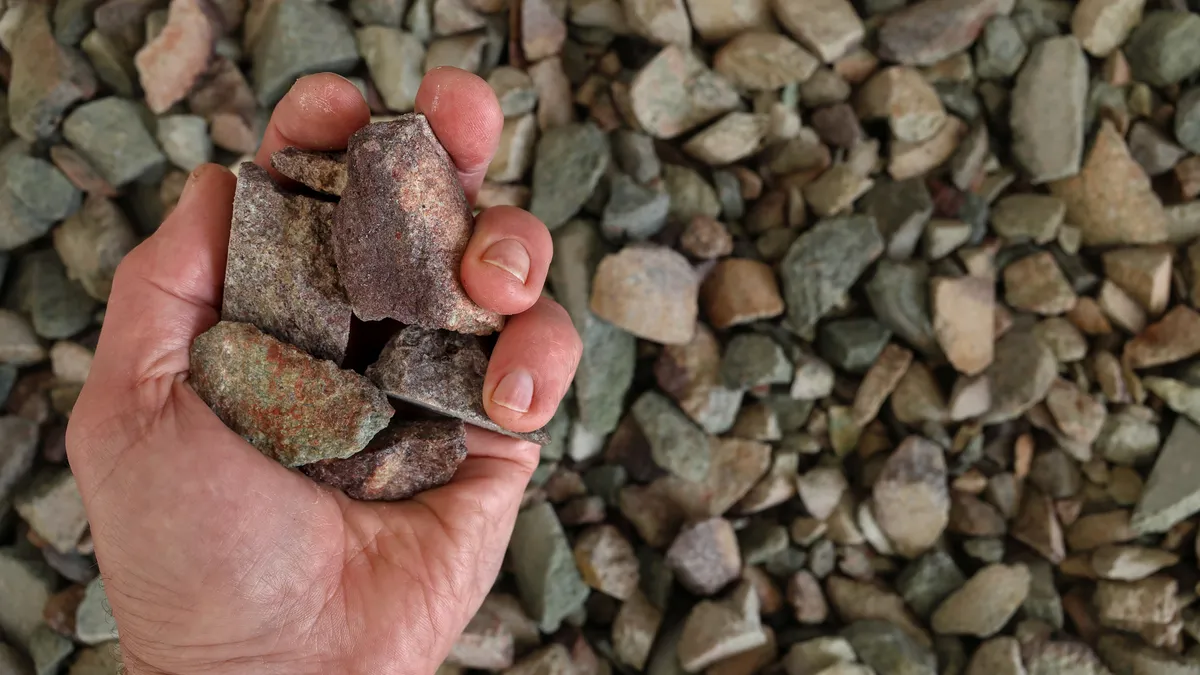Veolia's presence in the U.S. industry may be less visible than before, following an exit from the solid waste space — but that doesn't mean the global company isn't still deeply entrenched in efforts to manage some of the most complex material streams for customers, including chicken farms, semiconductor plants, chemical companies and plenty more.
In addition to servicing municipal and private clients for specialized waste needs, Veolia's North American division has a unique Total Waste Management arm that goes much further through consultation and on-site support. Given interest from other U.S. companies in expanding related offerings — and rising demand for "circular economy" solutions from corporate customers — this is seen as an area with growing business potential.
Waste Dive recently spoke with Veolia North America's Bob Cappadona — president and COO of environmental solutions and services — about changing demands among customers, how the company's European roots influence its offerings and even a potential solution for mounting PFAS challenges.
The following interview has been edited for clarity and annotated for context.
WASTE DIVE: How would you describe the size of your Total Waste Management business within Veolia North America?
BOB CAPPADONA: I have to look at it in two ways. One is business opportunities that we've pursued as being Total Waste Management opportunities, or relationships with customers that have evolved into Total Waste Management opportunities.
In the last few years, we've seen in the industry — both within Veolia and from our competitors — groups that have developed Total Waste Management businesses. We had something like that several years back, and then we've taken those walls down so that the Total Waste Management business is essentially embedded within our core business.
Cappadona said this accounts for more than $100 million of the company's annual business. Veolia North America's overall revenue for 2018, including non-waste services, was more than $2.2 billion. An estimated 250 employees are embedded with customers for waste and resource needs, sometimes with as many as 25-30 at one site.
It turns into a "can do" relationship where the customer is asking, can we handle solid waste, can we handle medical waste, can we handle low-level radioactive waste? Then, as the relationship grows with the customer, it goes from being a strictly waste management relationship to looking at what are the overall environmental goals for the company.
Do you feel Veolia is farther along on this than some competitors — especially with the mindset of not viewing it as just one line on the balance sheet — because of the European experience?
CAPPADONA: It aligns a lot with the general economic picture in the U.S. versus in Europe and elsewhere. In the U.S., especially today, you don't see an awful lot of subsidies when it comes to waste management. In other parts of the world, there may be better financial mechanisms that support waste management.
In parts of Europe, there's landfill taxes that will drive a decision on how a material is going to be handled. [In the U.S.] they did exist in the past, and some of them have been eliminated. Or they're small enough that they don't really drive the decision, with correlation between commodity pricing and recyclability of materials.
So if you look within the Veolia network, one of the things that we can do — and I think we're in a better position to do it than we ever were before — is to apply some of the things that are being done elsewhere in the world. We refer to ourselves as a global company, and over the years, I think sometimes that was a challenge. In the last several years, [it has become] much easier for us to apply things that are happening elsewhere in the U.S.
Right now in Henderson, Colorado, we are in the process of building a treatment network for material that's being generated on the West Coast. And we're using technology that we got in Europe.
Frankly, the customer was a little bit cynical about whether it would work or not. It's working perfectly, and it's going to provide both economic and environmental results for the customer to be able to pull material that previously was being disposed of.
What kind of material stream?
CAPPADONA: It's a water that has a solvent in it. But it also has a toxic constituent that is very difficult to handle, which makes traditional recycling more challenging. So looking at our regular solvent processing-type technologies, it just didn't fit. There wasn't enough solvent in it ... then it had a toxicity that prevented it from really being a wastewater treatment option. Because most wastewater treatment options with organics are going to be bio, which is going to involve bugs — but the toxic constituent is going to kill the bugs.
Veolia declined to specify the customer's name at this time.
Asked about other examples of unique solutions developed for customers, Cappadona mentioned finding a way to recycle a solid material similar to artificial logs for Dow Chemical in California. Using a proprietary process at its Azusa facility, Veolia is turning the material into a chemical compound that can be reused for new products. Cappadona described this as both avoiding incineration and having "tremendous savings."
That can be a challenging part of the recycling process. Oftentimes we can recycle material and may not necessarily have an outlet for the material, but in this case we were able to recycle it right back into the original process.
As this kind of offering becomes more common from you and other companies, do you find new customers are more likely to come to you in need of unique solutions? Or are there still some who need the basic 101 package as well?
CAPPADONA: I think it winds up being a little bit of both. When you enter into some of the the Total Waste Management relationships, some of the companies that we engage with will have 500-plus locations. At the majority of those locations, you're handling office paper and recyclables, and the occasional printer cartridge or something like that, or cleaning materials that need to be properly disposed of. But then they'll have a handful of sites where they're generating some very unique waste streams.
Again, I think that's something that's unique in Veolia: the research capability that we have both in the U.S., as well as globally, to take a waste stream from a customer and look at it from every angle, every technology — and try to identify a treatment process that hasn't been identified yet. I don't mean just by running it through the standard distillation or standard wastewater treatment things that other waste management companies do, but starting from ground zero — looking at the chemical characteristics of the material and the hazards associated with the material, and then identifying a potential solution for it.
One of the recent ones is the PFAS issue and the concern of, they're showing up everywhere. Veolia has done research on a filtering mechanism in order to remove PFAS from aqueous streams. Under a technology developed within the company, they've got a filter media that can reduce PFAS down to non-detectable levels in aqueous-type materials.
That's an environmental issue that a few years ago people weren't even aware of, and today, that material's not even listed as a hazardous waste. We've been able to, under the unique environmental challenge, develop a technology that can assist in managing it. It may not be the cure-all for everything, but it certainly can assist in minimizing the issue, concentrating the issue and getting it into the most treatable form.
The stories and the findings on PFAS are only growing by the day. Would that solution apply to landfill leachate?
CAPPADONA: Absolutely. When we first started a PFAS group here at Veolia, [it was] to look at, frankly, very black and white, what's the business opportunity? We looked at a very narrow group of environmental problems really targeted toward our incinerators. We could direct this material to our incinerators, but obviously, like you said, the issues with it have grown by the day and are being identified in so many different areas. We're looking at all different types of treatment technology.
If you find it in soil and put it in a landfill, then it's in a leachate. So you've now transferred the environmental concern. What's the potential to truly minimize, concentrate, eliminate the environmental concerns?
Are broader corporate sustainability goals set by customers also becoming a driver of business?
CAPPADONA: [We see] a spectrum of how companies participate in their pursuit of those goals. If you think about it, some consumer products are very sensitive to how the consumer perceives the environmental impact of the product. You think of all of the videos on plastics floating in the ocean. The last thing that companies want to see is their plastic container floating by with their company label ... So there's a strong driver for companies like that to identify a solution for recycling or the impact of their product.
As you get further away from the consumer, those goals can be remain the same — but they can also have a stronger financial component to it. In some cases, it can be a cost savings. In some cases, it can actually be a cost. That's an interesting spectrum for us to navigate when it comes to our first customer engagement. In the current financial times of environmental issues, that one can be challenging.
When you're talking about new sustainability offerings, do you find customers are willing to pay more sometimes to meet their goals, or are savings the key driver?
CAPPADONA: I think it aligns exactly with that company spectrum. There's some companies that it's "zero waste to landfill." They're going to set a time frame, they're going to make that commitment to the public and they're going to do everything they possibly can to meet it. Our goal then is to minimize the expense of getting to "zero waste to landfill."
There's other companies that they'll strive for it, but the pricing sensitivity on their product is such that they may not be able to afford it, dependent upon the environment that we're in. You look at the fluctuation of the price of oil in the last several years — it's had a major impact on certain products. So at one period of time, they could afford to make that environmental claim. At another point of time, they may not.
Cappadona compared the situation to current fluctuations for curbside recyclables and the ability of some municipalities to afford higher costs more than others.
Where do you see the total waste management business going in the next few years, and how might Veolia expand these offerings to be competitive in North America?
CAPPADONA: I think it will continue to grow with a couple of different influences. The corporate sustainability goals, certainly that is an influence on it. Financial influences [are another]. Companies don't want to be managing 14-15 different vendors providing services on site if they can get those services in a cost-effective way through one provider.
Customers looking at the skills that we have, across the diversity of services that we provide, can feel like, "if we turn the program over to Veolia, we're in good hands in all business lines," as opposed to having a specialist in certain areas. I think the diversity of services that we provide, and the level at which we provide them, has enabled us to continue to grow the business.
If we come on site, we want to be able to provide to a customer solid waste management, hazardous waste management, low-level radioactive waste management, medical waste management, special waste management and any other service that can have an impact on their environmental needs.
And then, given the size of the company, we're able to develop systems to support it across the network. We're not in a place where if a company asks us to do something, we then have to navigate and develop what the solution is going to be. We can take something that we're doing across the U.S., or we can take something across the world, and then apply it to a customer here in the U.S.
Cappadona went on to describe how Veolia has "centers of excellence" that facilitate daily information sharing and problem-solving across its portfolio.
The key part of it for us has been alignment of sustainability goals, financial goals and using the research component of Veolia. We joke about getting rid of the word "waste." I don't even know if I'd say it's a joke anymore ... We're not looking to just dispose of materials — it's, "how are we going to use them?"
Correction: A previous version of this article identified Bob Cappadona as COO of environmental services and solutions. His title is COO of environmental solutions and services.

















